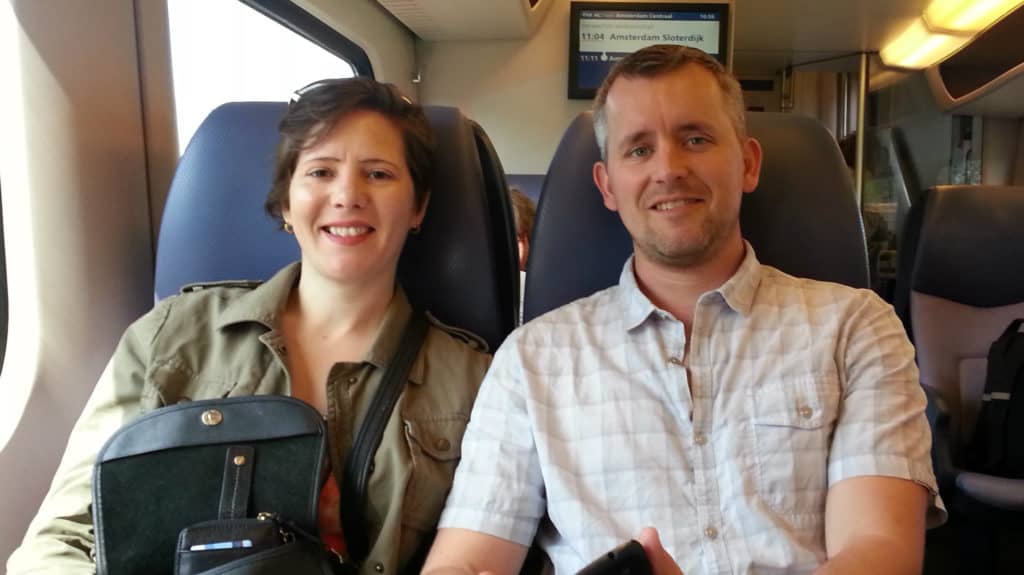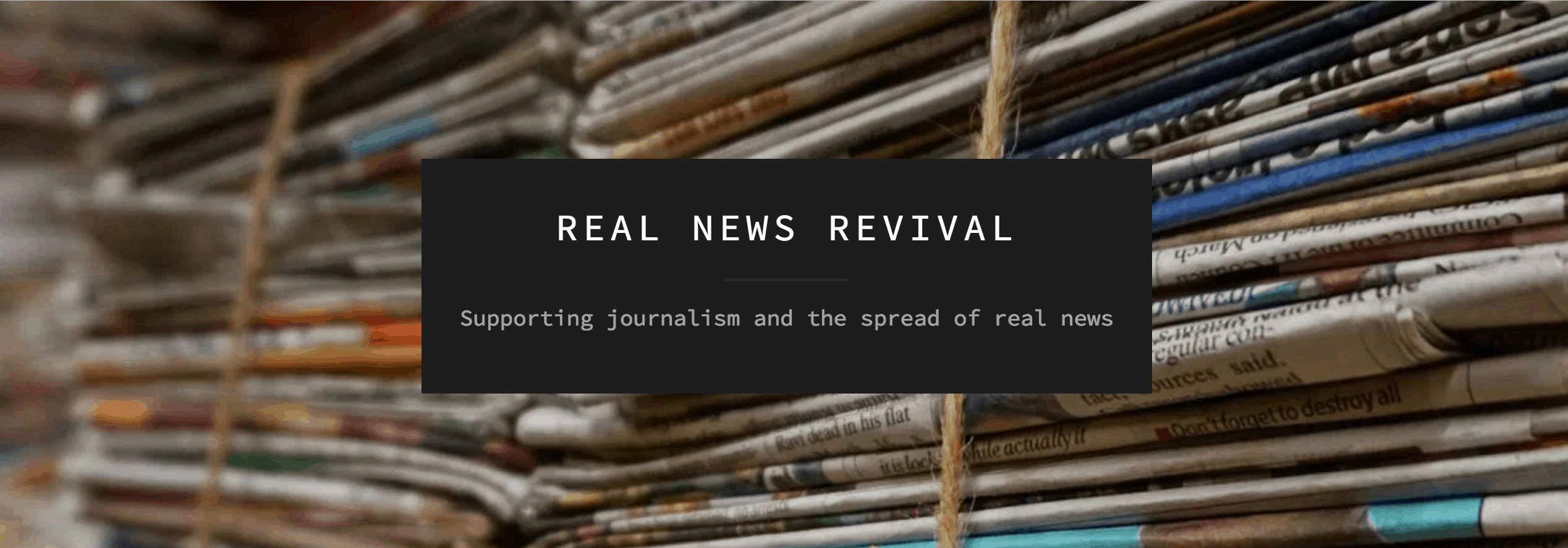TJP sat down with Laura Field and Austin Hart, founders of Real News Revival, to learn about how they are working to promote good journalism despite the proliferation of “fake news,” and how they “trust that even a small effort will make a difference.”
What is Real News Revival?
Laura Field [LF]: The Real News Revival is a new organization, devoted primarily to getting more people out of their media bubbles, reading (relatively) reliable sources of news.
Austin Hart [AH]: We want to spark a lasting civic commitment to journalists and journalism in a healthy democracy. If we honor and respect their work, then we have to do whatever it takes to keep them afloat.
What does Real News Revival do?
[AH] Our goal is to celebrate and support quality journalism. First, we ask anyone who values investigative work to support it actively through subscriptions. At a time when even major news organizations are in layoffs, we have an obligation to pay for the news we depend on. We advocate a buy-one-give-one approach: treat yourself to a subscription and give one away. Real News Revival is happy to help you at both stages. We maintain a list of “Real News Outlets,” and we donate newspaper and news magazine subscriptions to shelters, schools, hospital waiting rooms, etc. (learn more about our New Year Revival campaign).
Second, we promote philanthropic support for investigative journalism. In the same way that donors fund endowed chairs at universities, we want to help committed citizens create endowed research positions or investigative teams in newsrooms throughout the country.
Why did you start it?
[AH] We didn’t like the focus of the conversation after the election about fake news: how can we make it so everyone knows fake news is fake? Trying to ban fake news or label stories fake just seemed like the wrong approach. It’s too easy to shout “fake news” at information we don’t like, and that just amplifies the problem (as we’ve seen in the last month). So we wanted to do something positive instead. Let’s celebrate real news. Let’s support the work we depend on to understand the world beyond our daily experience.
[LF] Our aims are nonpartisan, but there’s no getting around the fact that Donald Trump’s election is a sign of increased polarization and political uncertainty among the American public. We are worried about the state of civic discourse in the country. There is a lot of anger and frustration on all sides, and not enough listening, thinking, and talking to one another. We think good journalism can work as a sort of compass for the broader discussions that we need to be taking on.
What is “fake news”? Is it a new phenomenon?
[AH] Fake news is a story that aims to deceive the reader. It isn’t just that the information, or some of it, is incorrect. What distinguishes fake news from simple misreporting is that fake news is incorrect on purpose. Purveyors of fake news want to blur the lines between truth and fiction, to make us distrustful of information (true or not) that doesn’t fit our prior understanding of the world. In essence, it overwhelms our capacity to make sense of the world around us.
Fake news isn’t unique to one presidential candidate, political party, or era. Our second president, John Adams, faced a fake news crisis that prompted the Sedition Act. The yellow journalists of the late 1800s waged what we might consider a fake news campaign in the lead up to the Spanish-American War.
[LF]We know that the motives of the authors are not always political. Sometimes these people just want to write something that will get a lot of clicks so that they can make money off the advertising. To get a lot of clicks, stories have to appeal to people, and the trouble is that people aren’t always attracted to pleasant, true things. Kittens seem to be the exception here. History tells us – and Plato, too – that human beings tend to love scandal and intrigue and drama and extreme emotional upset – not to mention affirmation of their most dearly held beliefs and prejudices. People love scandal, especially when it involves the ‘other’ side.
Second, for fake news to ‘work’ and get the most clicks, it can’t just be scandalous tabloid, and it can’t just be satire: it has to look real. So, the real art of creating fake news involves, I would assume, finding that sweet mix of salaciousness and believability that both entices and persuades. They are exploiting a weakness of human nature.
What has been the role of fake news in recent months?
[LF] This is a loaded question, and it’s impossible to know exactly the effect that fake news has had. But throughout the election a lot of false stories were put out that got a lot of attention, and they seem to have been written with the intention of misinforming the public and ultimately influencing their vote choice. There are some alarming statistics about how widely read some of the stories were, and lots of concern too about where the stories were originating.
[AH] We don’t see much value in searching out and shouting down stories as “fake news.” We’d rather celebrate the good and important work that real journalists still do every day around the world.
What made you think that you could make a difference?
[LF] Well, it’s more that we felt we had to try. There are plenty of examples of individuals making a big difference in the world, but we won’t flatter ourselves yet. We want to see if we can make this take off, and if it doesn’t work out, then we’ll learn from it and be in a better position to be more effective next time. Also, the press has seen major shifts and fluctuations in the past, so we think it’s worth trying to revive the industry even though it seems to be faltering.
How has the effort gone so far?
[AH] It’s been exhilarating, and slow and difficult, and pretty rewarding. We’ve been surprised how hard it is to reach people in meaningful ways and to get noticed.
[LF] We are committed to working on this incrementally over the course of the next year and seeing where it goes.

Who are y’all?
[AH] Expert revivalists! Actually we’re college professors, though neither of us teach journalism, or revivalism. We’re just really committed to finding simple ways to promote a thriving press in this country.
[LF] We both have PhDs in political science, but approach politics from very different perspectives. For all our differences, we both think reason is really important and that you can actually make a lot of progress in understanding – including political understanding – by reading, and thinking, and talking things through in a spirit of openness. The key thing though is that you have to be open to changing your mind.
Can ordinary individual citizens make a difference? What advice would you give someone passionate about an issue but who feels powerless to effect change?
[LF]I would advise them to try not to wallow in that feeling of powerlessness but instead to trust that even a small effort will make a difference. I think we are seeing a civic awakening across the political spectrum, and this is one great outcome of the election. Take heart in the actions of those around you, try to be good to your fellows, spend time reading and listening, and put your energy where your passions and talents meet.
Where can we go to find out more?
[AH] Find us on Facebook, follow us on Twitter, or read more on our website. We’re an accessible group, and we’re eager to talk.


